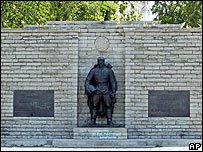
Yes, the Baby Boomer Generation is an annoying self-indulgent group and seemingly blatant hypocrites, have you seen Dennis Hopper hooking for Wall Street lately?, but one thing the Boomers did do is put on the table the hard issues of the time-poverty, identity, imperialism-even though they were maybe the most affluent generation of world history. They could have sat back and counted their change but many didn’t. So why does Barack Obama want to get beyond the debates of the Boomers and "the 60's?" Because the Right has neatly, and effectively, defined the 60's as a time of loose morals, America hating and pervasive lawlessness-read, black people in the streets rioting and committing crimes. So Barack Obama, cleverly, wants to redefine the debate so that he can benefit politically from, as the academics say, a paradigm shift.
Barack Obama wants to become a transcendent politician. He speaks about it all the time and he embodies the idea personally. It's a nice idea but what does it mean in the context of 2008? Two issues, race and empire, are at the center of why his task will be a difficult one.
The recent flare up about Barack Obama’s preacher bundled the issues neatly but earlier we have seen it on Tim Russert’s weekly chat with the powerful on NBC and his questioning of Barack Obama at the Democratic debate with Hillary Clinton a couple months ago. At the debate Russert wanted a denunciation of Louis Farrakhan and Jeremiah Wright and on Meet the Press in 2006 he asked Obama:
I want to talk a little bit about the language people are using in the politics now of 2006, and I refer you to some comments that Harry Belafonte made yesterday. He said that Homeland Security had become the new Gestapo. What do you think of that?
What’s Russert up to here? He seems like a nice muckraking type who asks the hard questions? But he is actually using the terms of the debate framed by the Right over the last 30 years or so. The Right wants to paint anyone who might question US foreign policy or question the institutional responsibility for millions of black and poor in the country as an America hater. There are many examples but the strategy has been so effective that wounded in action Vietnam Veteran John Kerry was easily dismissed as Ho Chi Minh’s secret agent even though the guy ran against a draft dodger. For Russert the way that he can show that he is a fair journalist is by outflanking anyone to the left of Joe Liberman by questioning their patriotism through association. And in this case the fact that his target of attack happens to be black helps link the idea that many black people are potential fifth columnists or sleeper cell Jihadi’s, isn’t that Barack Obama a Muslim? I am not saying that Russert is an active participant of the vast Right Wing conspiracy but that he has internalized the Right’s terms of debate and this makes him seem balanced in a media world that has been labeled liberal and biased.
Transcending race and empire then will be difficult for Obama then because of the way the Right has dominated the debate. If he brings up the issues of empire and the war in Iraq then he will be painted with the soft on “national security” angle. If he brings up race then he will be accused of playing the race card and being an angry black man that is soft on crime. The flag pin, no hand over the heart, is he Muslim flaps all are ways that these issues have been exploited. Combine these examples of Rosenberg type sabotage with a preacher on YouTube ranting “god damn America” and you have a decline in the polls for the transcendent hope.
The irony of the entire debate is that Barack Obama, and Hillary Clinton for that matter, are no threat to the empire or fundamentally changing the way race is mediated in United States society. Obama is not calling for closure of the hundreds of bases around the world that help maintain US power across the planet, he actually is calling for an increase in US combat troops. He is not calling for a serious change in the way the economy is organized that concentrates poverty and incarceration in the minority population. He does have a plan that concentrates “a few billion” at rural and urban areas but an increasingly globalized capitalism will not be simply tamed by a few billion dollars and a Charter School in Detroit.
Obama will have difficult time changing our interventionist policies around the world and race relations for two primary reasons 1) his liberal program does not fundamentally alter the ends of US power internationally which supports the free movement of capital and a world of inequality and 2) the Right will challenge his patriotism and loyalty because they will oppose anyone who does not embrace their program of maintenance of an international war machine to support US corporate power and a policy towards race that blame the victim.




